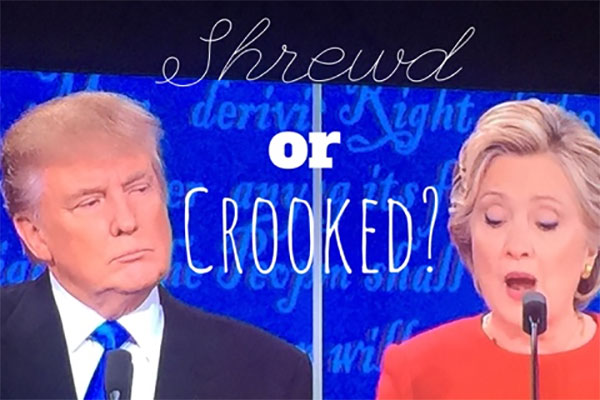
Jesus told his disciples: “There was a rich man whose manager was accused of wasting his possessions. So he called him in and asked him, ‘What is this I hear about you? Give an account of your management, because you cannot be manager any longer.’
“The manager said to himself, ‘What shall I do now? My master is taking away my job. I’m not strong enough to dig, and I’m ashamed to beg–I know what I’ll do so that, when I lose my job here, people will welcome me into their houses.’
“So he called in each one of his master’s debtors. He asked the first, ‘How much do you owe my master?’
“‘Nine hundred gallons of olive oil,’ he replied.
“The manager told him, ‘Take your bill, sit down quickly, and make it four hundred and fifty.’
“Then he asked the second, ‘And how much do you owe?’
“‘A thousand bushels of wheat,’ he replied.
“He told him, ‘Take your bill and make it eight hundred.’
“The master commended the dishonest manager because he had acted shrewdly. For the people of this world are more shrewd in dealing with their own kind than are the people of the light. I tell you, use worldly wealth to gain friends for yourselves, so that when it is gone, you will be welcomed into eternal dwellings.”
Luke 16:1-9
I was asked to prepare a children’s message on the above scripture recently. I realized it would be a tough and nuanced concept to try to explain to kids (and maybe even adults) in a 10-minute time slot. As I got down to business, I realized there was a major difference in my translations of this particular chapter–it’s titled “The Parable of the Shrewd Manager” in the NIV, but “The Parable of the Crooked Manager” in The Message. The words shrewd and crooked evoke dramatically different feelings for me, so I got to wondering: is one better than the other? Would that chapter title alone sway how I feel about the manager and his actions?
In a country currently fueled by political and ideological division, it’s a valid question. As I write this, the 24-hour news cycle is again abuzz with shocking and unforgivable words caught on tape from the Republican presidential candidate. Many are defending and dismissing Trump’s words and actions as “out of context” or “media bias,” but I’m not writing to dispute or affirm those claims. I am, however, asking the following question: what makes one person shrewd but another crooked? Who decides, and how?
We’re faced with a difficult choice this election season. Though I will proudly cast my vote for Hillary Clinton and believe she is ready to lead this country with experience and compassion, she is not perfect. Women in power don’t get there without having learned to play hardball, and I fear she is being held to a higher standard than that which we hold our male leaders.
Donald Trump, in contrast, is not ready to lead. He has no political experience, and his highly touted business acumen isn’t fully known since he won’t release his tax returns. While Clinton has a vast legislative record we can analyze (sometimes to her benefit, but sometimes not), we do not have the same abundance of material for Trump. An absence of a record doesn’t make him a better candidate (or a better person), it makes him a question mark and a liability. Frankly, he scares me.
I’ve seen a lot of folks—Christian folks, even—try to defend Trump with the argument that Hillary isn’t a saint, either. Both candidates are undesirable in some ways and in need of grace and possibly even repentance in others. But badness in someone else doesn’t make your bad less bad. Bad is still bad.
What we need to look at is fruit—has any good come from this imperfect person? Where is their heart? Is that reflected in their words and deeds? The shrewd/crooked manager in Luke took his influence and used it to better his situation so that once he lost his job he’d potentially have allies or at least a sympathetic business contact. He reduced the debt of others, which is a good thing, to make them more likely to help him, which could potentially be a bad thing. Not much different that politics these days, no? As Ecclesiastes says, there is nothing new under the sun.
The Bible gives Christians much to debate, but there is even more that is clear cut and universally understood: blessed are the poor, the meek, the merciful, the peacemakers, and the persecuted. That, friends, is never lost in translation.
Image by Christina Krost.
 About Christina Krost
About Christina Krost
Christina Krost is a wife, mother, and earth care advocate. She works for Faith in Place, an interfaith non-profit. She lives with her husband and three young daughters in rural central Illinois and blogs at 5matches.com. Her work has been in Brain, Child Magazine, ForEveryMom.com, and a 2015 anthology called Precious, Precocious Moments (Grace Publishing).
Leave a Reply